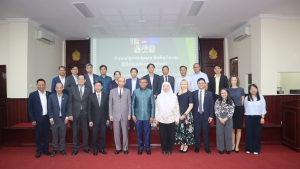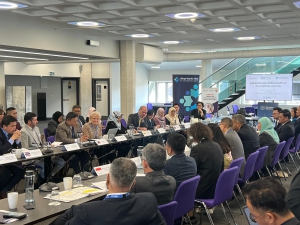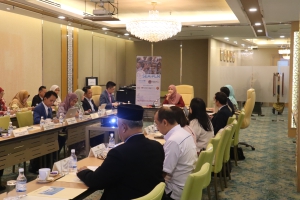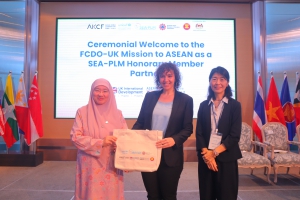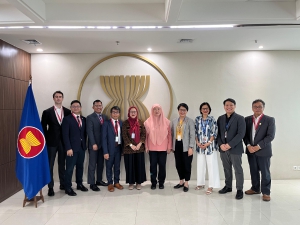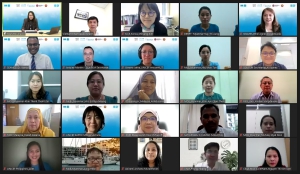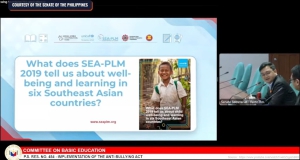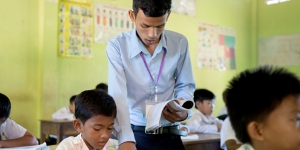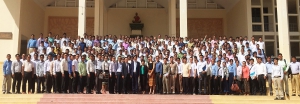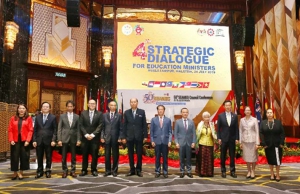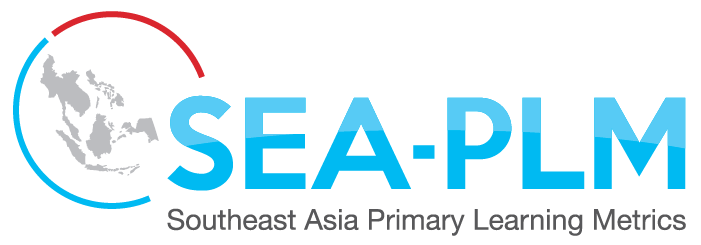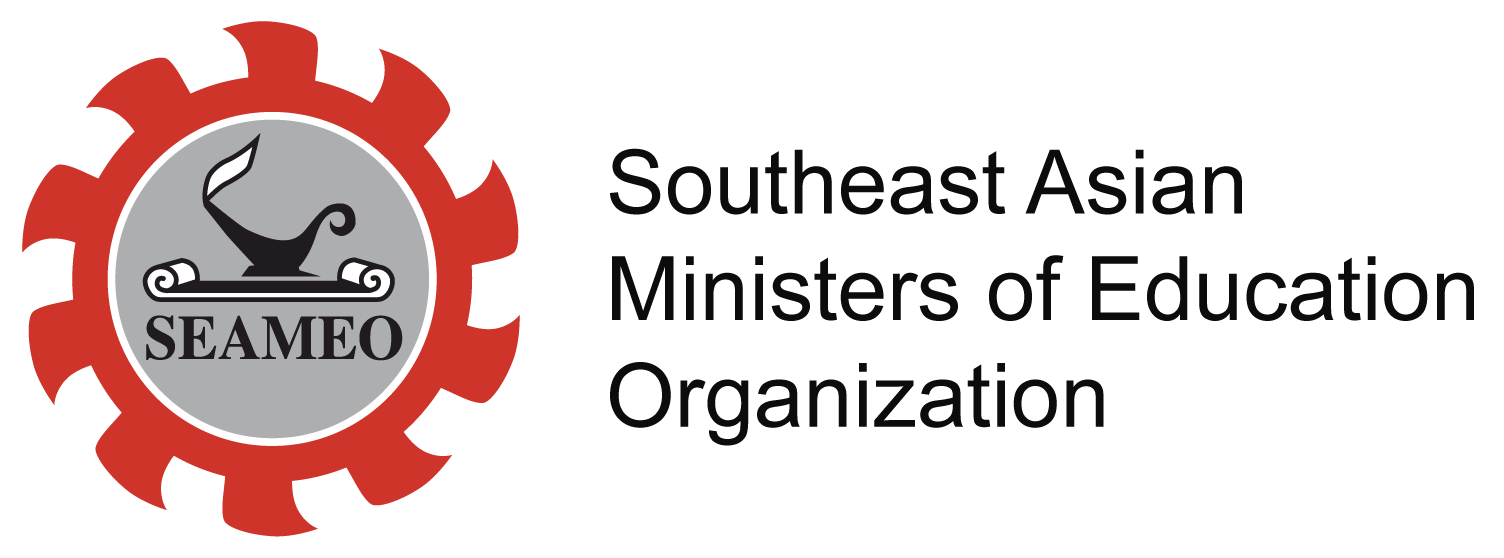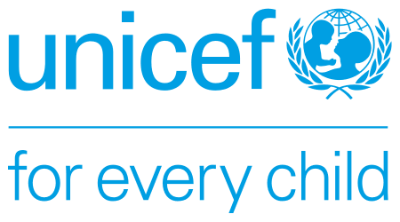Displaying items by tag: SEAPLM
Cambodia advances education reforms as SEA-PLM shifts to Evidence-to-Policy strategy
The SEA-PLM team met with His Excellency Dr. Hang Chuon Naron, Deputy Prime Minister and Minister of Education, Youth, and Sport of Cambodia, during the country-level strategic workshop held on 31 March – 1 April. In a high-level dialogue, Dr. Naron shared the Ministry’s policy priorities and best practices in advancing foundational learning as part of Cambodia’s ongoing education reforms. Datuk Dr. Habibah Abdul Rahim, Co-Chair of the SEA-PLM programme from the SEAMEO Secretariat, also contributed to the discussion, emphasizing the programme’s shift towards in-country support through the new strategy on Evidence-to-Policy linkages.
His Excellency Dr. Hang Chuon Naron, Deputy Prime Minister and Minister of Education, Youth, and Sport of Cambodia and Datuk Dr Habibah Abdul Rahim (SEAMEO Secretariat) at the start of the SEA-PLM Country level workshop in Cambodia
Following the high-level dialogue, the workshop introduced Initiative 2: the Evidence-to-Policy framework. This initiative aims to transform data and insights gathered from the SEA-PLM assessments into concrete, impactful educational policies. The evidence from the SEA-PLM 2019 highlighted a foundational skills crisis across Southeast Asia, with significant gaps in literacy and numeracy among primary school children. Addressing these challenges through evidence-based policies is a central goal of the initiative.
The workshop continued on its second day with robust discussions involving various stakeholders. Partners from diverse educational development organizations, the Ministry of Education, Youth, and Sport, and the SEA-PLM Regional Secretariat convened to explored collaborative approaches to translate educational evidence into policy actions to drive impactful reforms at national and sub-national levels.
Mr Alejandro Ibanez (SEA-PLM Programme Manager) facilitated the discussion during a country workshop in Cambodia.
Day three featured an engaging session on the new SEA-PLM System-Level Questionnaire, expertly facilitated by Dr. Fei Victor Lim from Nanyang Technological University (NTU). This session unpacked the complexities of policy environments in basic education, providing participants with deeper insights into effective policy-making mechanisms.
Cambodia outlined essential next steps to continue advancing foundational learning initiatives. These include activating the national steering committee, finalizing an analysis plan, identifying collaborative opportunities with the Regional Secretariat, and analyzing the data from the SEA-PLM 2024 survey, expected to be available for the Ministry of Education, Youth, and Sport in August. Additional activities involve producing a comprehensive national report, conducting secondary analyses, participating in the Regional Steering Committee, and actively engaging in the upcoming Foundational Learning Forum.
–
The UK supports SEA-PLM through the ASEAN-UK SAGE Programme, funded by UK International Development.
|
|
https://www.britishcouncil.id/en/programmes/education/asean-uk-sage |
|
|
https://x.com/SEAPLM_S |
|
|
Foundational learning takes center stage at ASEAN Ministerial Roundtable during 2025 Education World Forum
The Southeast Asia Primary Learning Metrics (SEA-PLM) took centre stage at a major global education event, participating in the ASEAN Ministerial Roundtable on Foundational Learning held at the Queen Elizabeth II Conference Centre in London from 18–22 May 2025, as part of the 2025 Education World Forum. The roundtable brought together ASEAN Ministers and High Officials, led by SEAMEO Council President Sonny Angara and Vice President Romaizah binti Haji Mohd Salleh, along with senior representatives from Cambodia, Lao PDR, Malaysia, Viet Nam, and Thailand. Discussions focused on the state of foundational learning across Southeast Asia and the urgent need to accelerate education reforms in response to the regional learning crisis.
Datuk Dr Habibah Abdul Rahim, SEAMEO Director, and Mr Alejandro Ibanez, SEA-PLM Programme Manager, at the Educational World Forum in London 2025.
SEA-PLM, represented through the SEAMEO Secretariat delegation and participating member countries, took part in the ASEAN Ministerial Roundtable to provide evidence and data on student’s foundational skills,highlighting both the urgent challenges and emerging policy responses drawn from robust regional data.
The sharing from the SEA-PLM Regional Secretariat focused on the tangible policy shifts that countries are implementing in response to these findings. For example, Lao PDR and the Philippines have initiated curriculum reform to improve early grade literacy, while Cambodia has increased investment in early grade learning following the pandemic. In addition, preliminary findings from SEA-PLM 2024 reveal promising improvements in various equity indicators and other learning metrics.
SEA-PLM’s new strategy Initiative 2: Evidence to policy linkages was spotlighted as a model for translating data into actionable reforms. This initiative supports countries in using assessment data to drive decision making at both national and sub-national levels.
As SEA-PLM prepares to release the 2024 regional results later this year, the insights are expected to provide countries with critical feedback on their post COVID recovery strategies. The result will also inform the programme’s strategic roadmap for 2026-2030, including preparation for the next regional assessment cycle, SEA-PLM 2029, which will align with the UN’s SDG 2030 targets.
Education World Forum 2025 Side Session
During the EWF, the SEA-PLM delegation also engaged in side meetings with key partners and stakeholders in the UK and beyond leveraging strategic partnerships and global coalitions to enhance the programme’s visibility and influence, and to sustain momentum in advancing foundational learning across Southeast Asia."
–
The UK supports SEA-PLM through the ASEAN-UK SAGE Programme, funded by UK International Development.
|
|
|
|
|
https://x.com/SEAPLM_S |
|
|
SEA-PLM Workshop in Malaysia Spurs Momentum on Foundational Learning
After a week of regional discussions in Malacca on foundational learning, the momentum continued in Putrajaya, Malaysia with the Country-Level Strategic Workshop under SEA-PLM’s initiative 2: Evidence to policy linkages on 5 - 6 May.
Following the successful implementation of 15th SEA-PLM Regional Steering Committee and the Foundational Learning Forum, the workshop contributes to Malaysia’s efforts to transform learning outcomes through data driven education reforms. During the workshop, the national teams and the SEA-PLM Regional Secretariat engaged in in-depth discussions on the work plan to identify opportunities and areas for improvement in foundational learning in the country. These discussions followed the review of the successful implementation of the 2024 main survey, with results set to be published towards the end of the year.
Her Excellency Ms. Fadhlina Sidek, Minister of Education Malaysia, joined the high-level dialogue on the first day of the meeting
The workshop opened with a high-level dialogue between the SEA-PLM Regional Secretariat and Her Excellency Ms. Fadhlina Sidek, Minister of Education Malaysia. The dialogue put a spotlight on Malaysia’s successful implementation of the SEA-PLM 2024 Main Survey.
With participation from key departments across the Ministry of Education, education officials, technical experts, and national partners, the workshop dived deeply into 2024 preliminary results, highlighted key trends, and planned collaborative actions. The workshop discussed translating this compelling evidence into practical reforms that strengthen foundational skills in reading and mathematics for all students in Malaysia.
Mr Alejandro Ibanez, SEA-PLM Programme Manager , shared the preliminary regional results of SEA-PLM 2024
One of the main takeaways from the discussions was the country’s strong commitment to ensuring that every child, regardless of background, acquires essential literacy and numeracy skills. This commitment was grounded in the SEA-PLM data, which not only highlighted gains but also exposed persistent challenges such as the enduring impact of the COVID-19 pandemic and widening equity gaps. These insights directly informed the development of a forward-looking national action plan aimed at addressing structural barriers in early grade learning and improving school conditions.
Participants from the Ministry of Education Malaysia and the SEA-PLM Regional Secretariat
Malaysia’s commitment to address foundational learning in the country is also reflected in its strategic use of SEA-PLM evidence to support ongoing national programmes, such as the Reading Aid Programme, the basic literacy module, and Special Remedial Interventions. By anchoring these initiatives in robust, comparable data, the Ministry is well positioned to drive reforms that are not only responsive but also sustainable.
Furthermore, the workshop also underscored the broader goals of SEA-PLM’s Initiative 2, enabling Southeast Asian countries to go beyond assessments and meaningfully link evidence to policy design and implementation. Looking ahead, the insights and plans developed during this workshop will contribute to the regional launch of the SEA-PLM 2024 report in November. This launch will not only present new evidence but also showcase how countries like Malaysia are responding, turning data into action and commitment into impactful outcomes.
–
The UK supports SEA-PLM through the ASEAN-UK SAGE Programme, funded by UK International Development.
|
|
|
|
|
https://x.com/SEAPLM_S |
|
|
SEA-PLM Welcomes FCDO as Honorary Member Partner through the ASEAN-UK SAGE collaboration
The Southeast Asia Primary Learning Metrics (SEA-PLM) programme, through its Co-Chairs, proudly welcomed the Foreign, Commonwealth and Development Office (FCDO) of the United Kingdom as its newest Honorary Member Partner during the 15th SEA-PLM Regional Steering Committee (RSC) Meeting held in Malacca, Malaysia on 28 April 2025.
FCDO was represented at the 15th RSC Meeting by Ms Isla Gilmore, Education Advisor at the UK Mission to ASEAN based in Jakarta, Indonesia. This partnership underscores a shared commitment to advancing evidence-based policies that improve learning outcomes and promote equity in education across the region. This marks a new milestone for SEA-PLM as it expands its network of regional and international partners supporting high-quality data collection, capacity building, and policy dialogue to ensure every child in Southeast Asia achieves foundational learning.
“We are pleased to welcome the UK as an honorary partner of the SEA-PLM programme,” said Datuk Dr Habibah representing SEAMEO. “Their commitment to gender equality and foundational learning aligns closely with our mission to foster inclusive and quality education systems in the region.”
The participation of the FCDO further amplifies SEA-PLM’s regional influence and reinforces its capacity to mobilize global support for Southeast Asian education reform. The SEA-PLM Programme is jointly governed by the SEAMEO Secretariat and UNICEF East Asia and Pacific Regional Office, and implemented in partnership with SEAMEO Member Countries, aiming to foster a culture of da0ta use to improve primary education systems and learning outcomes across the region.
–
The UK supports SEA-PLM through the ASEAN-UK SAGE Programme, funded by UK International Development.
|
|
|
|
|
|
|
|
13th ASEAN-SEAMEO Secretariats Coordination Meeting Boosts Regional Education Cooperation
On January 15, 2025, the 13th ASEAN-SEAMEO Secretariats Coordination Meeting took place at the ASEAN Secretariat Office in Jakarta, Indonesia. The gathering served as a significant platform for ASEAN and SEAMEO to discuss advancements in the region’s education agenda and review key initiatives, such as the outcomes of the annual regional meetings in education and related activities.
The meeting delved into several pivotal topics including updates from both the ASEAN and SEAMEO Secretariats. The discussion featured detailed presentations on the progress of the SEA-PLM programme, the ASEAN-UK SAGE Programme, SEA-DREAM Programme, and the Roadmap for the ASEAN Leaders’ Declaration on Early Childhood Care and Education (ECCE) in Southeast Asia. The meeting was attended by Ms. Rodora Turalde-Babaran, Director of the ASEAN Secretariat’s Human Development Directorate, Ms Amalia Serrano, Senior Officer Education Youth and Sports Division ASEAN Secretariat, Mr Muhammad Dika Harliadi, Officer at the Education, Youth and Sports Division ASEAN Secretariat, Datuk Dr. Habibah Abdul Rahim, Director of SEAMEO Secretariat, Professor Vina Adriany, Ph.D., Director of SEAMEO CECCEP, Mr John Arnold Siena, Deputy Director for Programme and Development of SEAMEO Secretariat, Mr Emiljohn Santillas, Policy and Planning Specialist, Alejandro Ibanez, SEA-PLM Programme Manager, and Mr Ansgar Shaefer, Head of Programme Developing Research Excellence and Mentorship in Southeast Asia (SEA-DREAM).
The ASEAN-UK SAGE initiative focuses on advancing girls’ education by addressing foundational learning gaps, supporting out-of-school girls, and promoting digital skills, with successful pilot project engagements in Cambodia, Lao PDR, and Timor-Leste. Similarly, the SEA-DREAM Programme, supported by Wellcome Trust and the UK Foreign, Commonwealth & Development Office, aims to enhance health and climate-related research excellence in Southeast Asia through mentorship, regional collaboration, and the development of future research leaders. The meeting also underscored the progress on the Roadmap for the ASEAN Leaders’ Declaration on ECCE, a critical step towards ensuring high-quality early childhood care and education across Southeast Asia, through multi-stakeholder collaboration.
During the session, Mr Alejandro Ibanez provided an overview of the SEA-PLM programme's key achievements and ongoing initiatives. SEA-PLM serves as Southeast Asia’s regional large-scale learning assessment mechanism, aligned with SDG 4.1.1 indicators, to monitor and enhance education quality and equity across SEAMEO Member Countries.
Significant milestones highlighted at the meeting included the successful completion of the SEA-PLM 2024 Main Survey, which involved extensive data collection from students, parents, teachers, and school principals across participating countries. To ensure inclusivity, assessment materials were translated into 11 national languages. Another important advancement was the establishment of the SEA-PLM Technical Experts Network, designed to strengthen quality assurance and regional expertise.
In the upcoming months, SEA-PLM will organize country-level workshops aimed at supporting governments in transforming SEA-PLM data into effective educational policies. Additionally, the highly anticipated results of the SEA-PLM 2024 assessment are scheduled for release in the fourth quarter of 2025.
Looking forward, the SEA-PLM team presented their strategic vision to maximize the programme's impact by translating assessment findings into actionable policy recommendations, enhancing technical capacity-building, and securing long-term programme sustainability through improved governance and resource mobilization.
The meeting emphasized the need for stronger collaboration, leveraging SEAMEO’s reach and ASEAN’s convening power, highlighting complementarities in the delivery of the programmes. The collaboration is particularly needed as Malaysia takes the 2025 ASEAN Chairmanship with a focus on inclusivity and sustainability. Both parties agreed to intensify the partnership, optimizing existing resources at the regional-level from dialogue partners such as the Aus4ASEAN Futures which is a new flagship initiative to advance the Comprehensive Strategic Partnership (CSP) between ASEAN and Australia and the EU-ASEAN Sustainable Connectivity Package – Higher Education Programme (SCOPE-HE) which represents a significant step forward in EU-ASEAN cooperation in the region.
The 13th ASEAN-SEAMEO Secretariats Coordination Meeting reaffirmed both organizations' commitment to strengthening education collaboration and addressing regional challenges. By advancing foundational learning, research excellence, and early childhood education, ASEAN and SEAMEO continue to drive meaningful progress toward a more inclusive and equitable education landscape in Southeast Asia. The next coordination meeting will be hosted by the SEAMEO Secretariat scheduled in 2026.
SEA-PLM 2019 evidence: Holistic well-being of children leads to better learning outcomes
Virtual | Anieluz Pastolero: The SEA-PLM 2019 data reveals that children who possess good physical and mental states and have basic knowledge and concern about environmental issues tend to perform better academically than those who do not.
This was the crux of the discussion during the policy forum webinar on “Child Well-being and Learning in Six Southeast Asia: Insights from the SEA-PLM 2019 evidence” held virtually on 17 March 2023.
The policy forum webinar discussed the study conducted by UNICEF-Innocenti Global Office of Research and Foresight highlighting bullying as the most prevalent form of violence experienced by children in school, affecting 35% of students from participating countries. The report recommends establishing a zero-tolerance policy towards bullying, offering counselling services, and promoting intercultural activities to create a secure learning environment.
Surprisingly, the introduction of environmental topics has a positive impact on children’s learning outcomes in reading, writing, and mathematics. The report found that children are concerned about various environmental issues such as pollution, water scarcity, energy shortages, and extinction of plants and animals.
Co-author of the report, Ms. Ximena Jativa, acknowledged the multifaceted nature of child well-being. She recommended intersectoral collaboration to ensure social and child protection, investing in basic WASH facilities (Water, Sanitation, Hygiene), reviewing policies on mental and physical well-being, allocating resources, and providing school-based safety nets like meals to ensure the holistic improvement of child well-being for Southeast Asian students.
While the SEA-PLM is primarily a learning assessment for grade 5 students in the region, Mr. Antoine Marivin, SEA-PLM Senior Project Manager, stressed the importance of investigating factors beyond the traditional cognitive proficiency tests that affect a child’s learning achievements.
The SEA-PLM findings highlighted the importance of being aware of the status of children in school and the need to prioritise their well being.
SEA-PLM 2019 evidence sheds light on bullying in schools at Philippine Senate Hearing
Manila, Philippines | Anieluz Pastolero: The Philippine Senate Committee on Basic Education cited the SEA-PLM 2019 evidence as a crucial resource in shedding light on the prevalence of bullying in schools and its impact on learning outcomes during the public hearing to review the implementation of the Anti-Bullying Act of 2013 on 13 February 2023.
Led by Senator Sherwin Gatchalian, the Committee underscored during the hearing the use of data such as those provided by SEA-PLM 2019 and called for an improvement in reporting mechanisms to encourage students to report bullying incidents.
The SEA-PLM 2019 data revealed that 63.2% of Grade 5 students in the Philippines experience bullying at least once a month in schools. This figure is consistent with the National Baseline Survey on Violence Against Children conducted by the Council for the Welfare of Children in 2016, which found that 65% of students in the Philippines have experienced bullying. The same level of prevalence is also affirmed by the data from the Programme for International Student Assessment (PISA), which the Philippines participated in 2018.
The Philippine Senate hearing emphasized the need to address bullying in schools in the country and to prioritize the well-being of students. The data from SEA-PLM 2019 highlights the significance of the issue and the need for effective measures to address it, including improving reporting mechanisms and implementing policies that protect students from bullying and creating a safe school environment.
Project Manager Alejandro Ibanez represented SEA-PLM Secretariat and SEAMEO Secretariat in the said hearing.
SEA-PLM 2019 Latest Evidence in Basic Education: Supporting teachers to improve learning in 6 Southeast Asian countries
SEA-PLM 2019 Latest Evidence in Basic Education: Supporting teachers to improve learning in 6 Southeast Asian countries
This paper highlights the diversity of the Southeast Asian teacher workforce, their classroom conditions, and their level of preparation and training upon entry to the profession.
The findings recommend the development and implementation of policies and programs to strengthen the teacher workforce and redirect the focus to ensure teachers have supportive working conditions, and comprehensive training and professional development aligned with the teacher workforce’s needs.
This document has been published and is available for download
Appendix B: Statistical tables
Recommended citation: UNICEF & SEAMEO. (2021). SEA-PLM 2019 Latest Evidence in Basic Education: Supporting teachers to improve learning in 6 Southeast Asian countries. United Nations Children's Fund (UNICEF).
Cambodia Prepares Test Administrators in Battambang
From June 10th until12th the Cambodian Technical Team organised the training of over 250 Test Administrators and School Coordinators at Battambang University, Battambang. All SEA-PLM participant countries implement a standardized training to those selected to coordinate and administer the tests to students and questionnaires to students, parents, teachers and principals. This is to ensure the same steps and script is applied consistently across all schools.
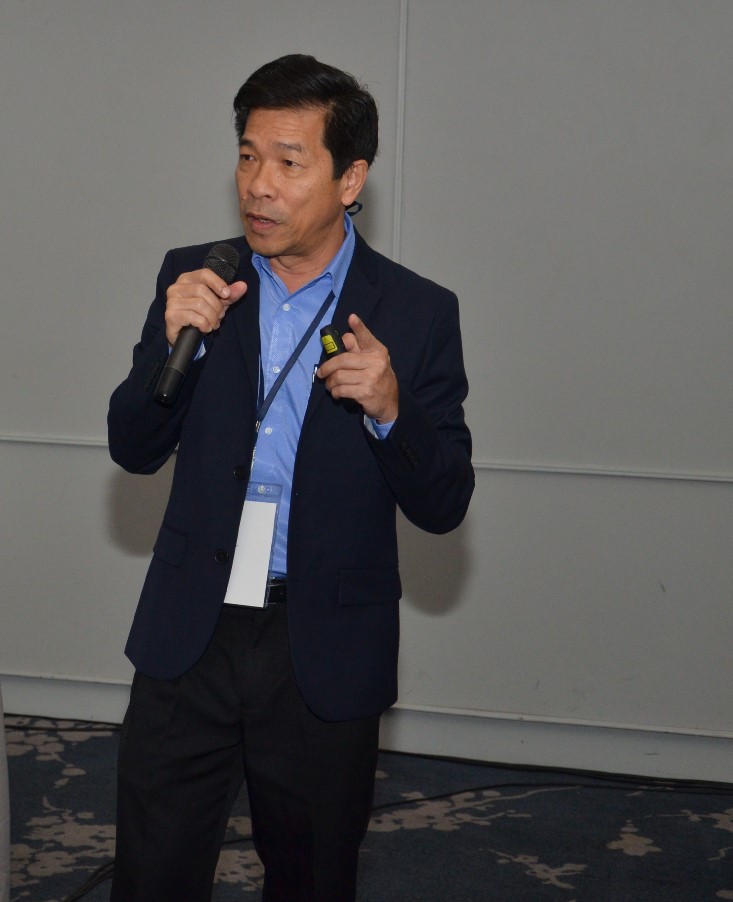 Learning assessment, described by Director of Education Quality Assurance Department (EQAD) Mr. Ung Chinna as the current "pop-star of education" in Cambodia, is receiving increased emphasis at the policy level, promoting the better use of information generated through assessment to form the basis of education reform across relevant departments and key stakeholders. SEA-PLM plays an important role in this transition. Through providing capacity development to EQAD staff in how to manage large-scale assessments at international standards, the team are able to apply these standards to national and international assessments, and increasingly advocate for the need of assessment from the national to school level.
Learning assessment, described by Director of Education Quality Assurance Department (EQAD) Mr. Ung Chinna as the current "pop-star of education" in Cambodia, is receiving increased emphasis at the policy level, promoting the better use of information generated through assessment to form the basis of education reform across relevant departments and key stakeholders. SEA-PLM plays an important role in this transition. Through providing capacity development to EQAD staff in how to manage large-scale assessments at international standards, the team are able to apply these standards to national and international assessments, and increasingly advocate for the need of assessment from the national to school level.
It is also through the support of major partners such as UNICEF that this growing focus and capacity in using learning assessments to identify gaps and inform educational reform is achieved. UNICEF Cambodia is a vital partner for SEA-PLM in Cambodia, contributing both funding and organisational support to its implementation.
The training, mostly delivered by Technical Team Manager Mr. Sar Sarin, was attended by representatives from the Ministry of Education, Youth and Sports, UNICEF Country Office, SEAMEO Secretariat and the Australian Council for Education Research (ACER).
The 4th Strategic Dialogue for the Education Ministers
H E Dr Maszlee Malik, Minister of Education Malaysia and SEAMEO Council President welcomed the delegates to the 4th Strategic Dialogue for Education Ministers (SDEM) and invited them to listen to some expert perspectives on Sustainable Development Goals specifically on Inclusive and Equitable Education and Lifelong Learning, Technology and the Future of Education as well as Partnership and Collaboration for the Future of Education. In his remarks, he pointed out that the forum is directed to cover issues and progress that support the implementation of the SEAMEO Education Agenda and 7 Priority Areas toward the achievement of UN Sustainable Development Goal No. 4.
The 4th Strategic Dialogue for Education Ministers was led by the SEAMEO Secretariat in collaboration with UNESCO Bangkok Office. There were roundtable sessions with highly respected speakers to deliver thematic keynote presentations.
Session I Theme: Sustainable Development Goals and the Implications for the Inclusive and Equitable Education and Lifelong Learning in Southeast Asia
 In this session, Mr. Shigeru Aoyagi presented UNESCO's views on the Sustainable Development Goals (SDGs) by outlining three key messages;
In this session, Mr. Shigeru Aoyagi presented UNESCO's views on the Sustainable Development Goals (SDGs) by outlining three key messages;
- Southeast Asia (SEA) countries are not on track to achieve the SDGs.
- SEA will not achieve the SDGs by 2030, particularly SDG4 with current practices.
- SEA must change according to current times and trends.
He reiterated that the SDGs must be reinterpreted critically in light of the new challenges of current times and the shifting demands from the job market. He urged SEAMEO members to discuss, deliberate and determine the next key recommendations that will consider these issues.
This session was followed by a roundtable discussion led by Ms Azlina Kamal, an Education Specialist of UNICEF Malaysia as the moderator. The session aims to get the reflections, insights as well as experiences on the said theme from the panelists H E Dr Maszlee Malik, Minister of Education, Malaysia; H E Assoc Prof Dr Khamphay Sisavanh, Deputy Minister of Education and Sports, Lao PDR; H E Dr Leonor Magtolis Briones, Secretary of Education, Philippines; and H E U Win Maw Tun, Deputy Minister of Education, Myanmar.
Session II Theme: The Future of Education: Leveraging Technology in Artificial Intelligence (AI) and Machine Learning for Quality and Equitable Education
In this session, Dr Fengchun Miao, Chief of the Unit for ICT in Education, UNESCO Headquarters presented the future of education to address leveraging Artificial Intelligence (AI) to achieve SDG 4 - Education 2030 by outlining the issues include:
- How to ensure ethical, inclusive & equitable use of AI in education?
- How can education prepare humans to live and work with AI?
- How can AI be leveraged to enhance or reinvent education?
In this opportunity also, UNESCO extended an invitation to audience to participate in 2019 UNESCO ICT in Education Prize with the theme "The Use of AI to Innovate Education, Teaching and Learning", on 31 October 2019.
This session was followed by a roundtable session led by Dr Chantavit Sujatanond, SEAMEO RIHED Director as the moderator. The session aims to get the reflections, insights as well as experiences on the said theme from the panelists H E Dato Seri Setia Awang Hj Hamzah bin Hj Sulaiman, Minister of Education, Brunei Darussalam; Dr Totok Suprayitno, Head of Research and Development Agency, Ministry of Education and Culture, Indonesia; H E Mr Ong Ye Kung, Minister for Education, Singapore; and H E Prof Dr Phung Xuan Nha, Minister of Education and Training, Vietnam.

Session III Partnership and Collaboration for the Future of Education in Southeast Asia.
In this session, Mr Francisco Benavides, UNICEF Education Advisor, UNICEF EAPRO delivered the topic of partnership focusing on how partnerships and collaborations will help us in the future. Instead of trying to stress on the importance of partnerships, he seeks to bring to the floor some elements or evidences of how some partnerships can lead to successful results or failures in educational reforms. The first part of the presentation is to link this partnership approach. The key points discussed are as follows:
- Why partnerships and the SDG agenda?
- Education challenges and evidence from successful reforms
- Types of partnerships and examples in the EAP region
- Some ideas for reflection
He spoke on governments with strategies that will benefit children. He underlined that clear vision and strong leadership from all sectors are crucial to create a strong partnership and collaboration. There is no question about the importance of having a vision that is embraced and led by a group of people leading which in this case are the ministers of education.
After the session a roundtable discussion led by Mr Hyun Mook Lim, Director, UNESCO APCEIU as the moderator. The roundtable discussion aims to get the reflections, insights as well as experiences on the said theme from the panelists H E Dr Maszlee Malik, Minister of Education, Malaysia and SEAMEO Council President; H E Dr Nath Bunroeun, Secretary of State, Ministry of Education, Youth and Sport, Cambodia; Ms Duriya Amatativat, Deputy Permanent Secretary for Education, Thailand; H E Mr Maria Olandina Isable Caeiro Alves, Ambassador
Session VI Voices from Associate Member Countries
Ms Bernadine Caruana, Counsellor (Education & Science), Australian High Commission, Malaysia; and Ministry of Education and Training, Australia shared her perspective on the future of education and future work and the drive to build 21st century skills. She mentioned that bringing in technologies and innovations can only be done through partnerships. She added that the speed of change is so great that if we are not working together nor building on each other's knowledge would be a loss. Working together to gain faster outcomes is for the betterment of the nation.
Mr David G Ferron Priestley, Counsellor for Education in Australia, New Zealand, the Philippines, Singapore and India, Embassy of Spain in Canberra; and Ministry of Education and Vocational Training, Spain talked about the aspects of EU Post ET 2020 which has similar goals like SEAMEO. He focused on the Post ET 2020 Strategy which is based on the Gothernburg Pillar of Social Rights. He identified five significant aspects that guaranty equality, quality, and equity. The five aspects include education, artificial intelligence, life-long learning, and languages.
At the end of the session, the SEAMEO Secretariat Director, Dr Ethel Agnes Pascua Valenzuela presented the Strategic Dialogue of Education Ministers of Education: Commitment to Action which had been presented to the ministers which testify the commitment of the SEAMEO members.
The document testifies the commitment of the SEAMEO Ministers of Education which contains the SDG goals presented in the conference as well as AI and situations in each member country.
The document also conveys a commitment to action among the SEAMEO member countries as well as affiliate institutions and partners on three key areas:
- to work cooperatively to promote inclusive education driven by innovation and empowering a new generation of teachers and lifelong learners in the use of digital technology
- to create a policy environment that will help bridge the digital divide and pursue digital transformation in a more systemic level through informed policymaking assisted by SEAMEO Centres research and development initiatives, promoting relevant and contextualized pedagogy for the digital era
- to encourage partnerships and alliances that create and build an innovative SEAMEO educational ecosystem where mutual ideas can be created and promoted paving new ways of learning and teaching beyond teaching technological skills.
To close the 4th Strategic Dialogue for Education Ministers, H E Dr Maszlee Malik, Minister of Education, Malaysia thanked everyone for their participation and attendance. The keynote speeches and roundtables were presented highlighting three important themes. The first roundtable focused on the SDGs and the quest for more inclusive and equitable learning. He thanked the Deputy Ministers of Education from Lao PDR, the Philippines and Myanmar for sharing their educational programmes which moved towards universal access to free basic education. He closed his remarks by stressing that the success of SDGs hinges upon the ability to collect and analyse data successfully as well as ensuring that education is a collective responsibility from every level of society.

